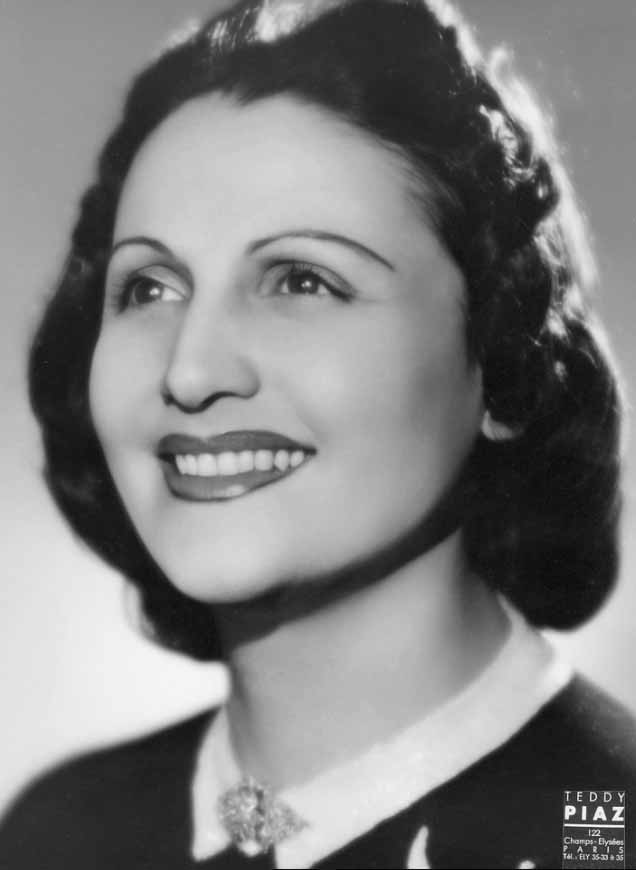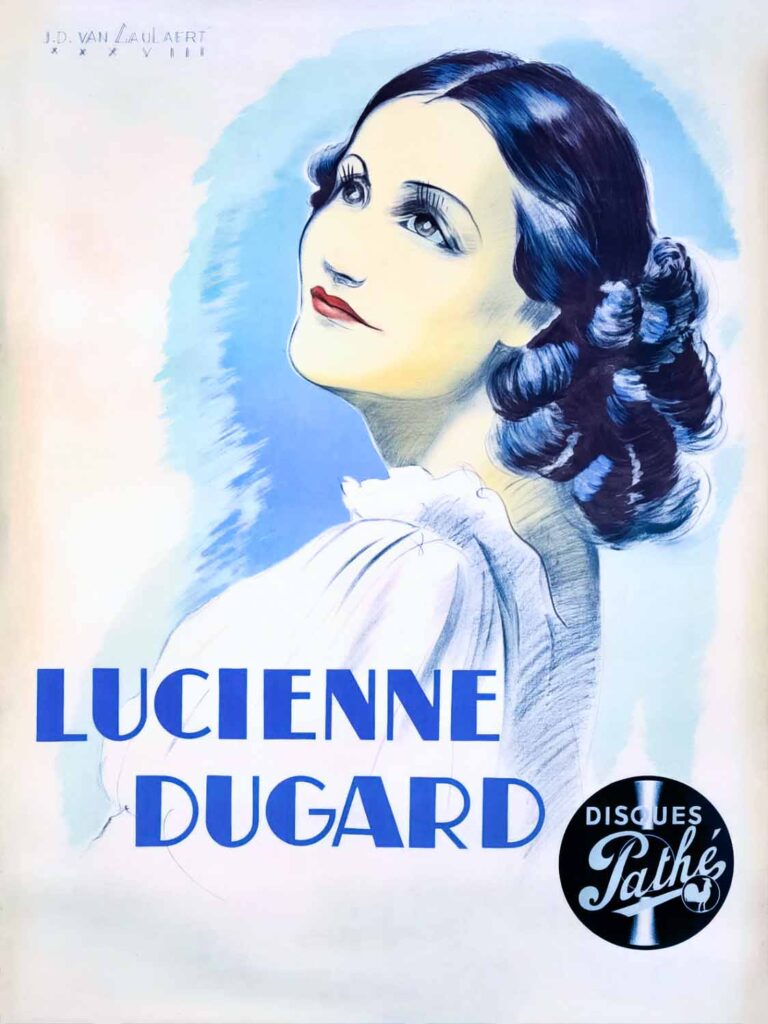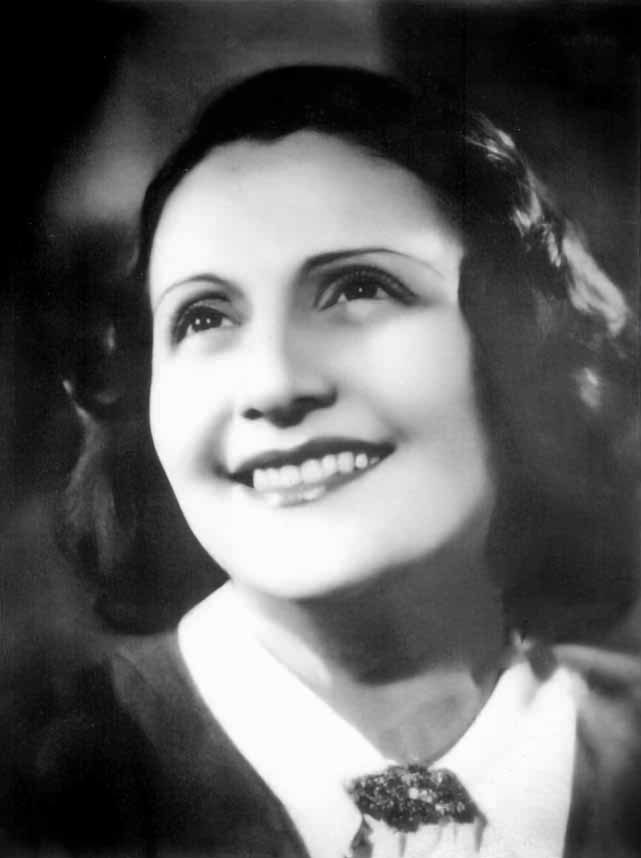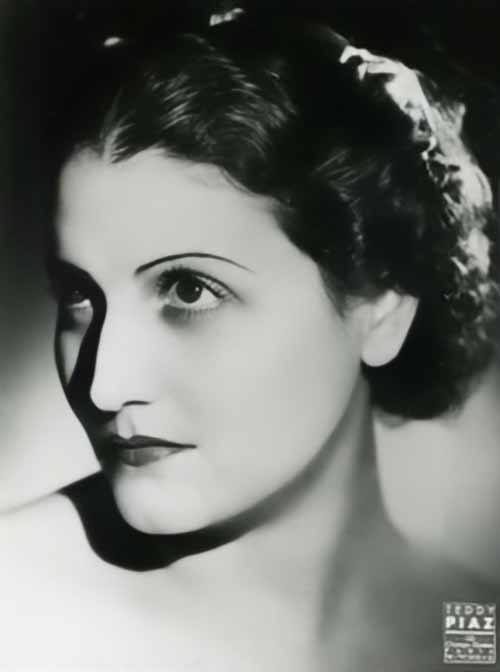Information
Full name: Noëlie Lucienne Rose Gros
Birth: December 25, 1901 in Nîmes, France
Death: September 22, 1968 in Bougival, France
Marriages:
André Beaugé (July 30, 1929 – ?)
Jules Georges Moneron (? – September 22, 1968)
Job on Snow White:
Singer on the Snow White record Pathé PA 1522
Singer on the Snow White record Pathé PA 1608

From Miss Gros to Mrs. Beaugé
Lucienne Dugard wasn’t the first artist to record Snow White songs, but she was one of the first, and is undoubtedly one of those best remembered and, along with Élyane Célis, the one whose popularity exploded thanks to Snow White. Her recordings have been frequently reissued in a variety of formats. Thanks to them, she won the 8th Grand Record Award for “Candide” alongside Charles Trenet in December 1938, and the general public long mistakenly believed that the singer also lent her voice to the character in the film. Who is Lucienne Dugard?
Born Noëlie Lucienne Rose Gros on Christmas Day 1901 in Nîmes, she died in Bougival on September 22, 1968. Three days before the film’s French premiere, La Dépêche Toulousaine still considered her “a brilliant new recruit”. In fact, although she had already made a number of recordings and taken part in radio programs (with Robert Laurence), the name “Lucienne Dugard” only really became popular around the time of the film’s release. That’s because, until then, her career as a singer had begun at the Opéra-Comique under the name Lucienne Baugé, married to actor and baritone André Baugé since July 30, 1929, with successes in Lakmé, for example. André was a star of the screen at the time, playing the role of Figaro among others. Lucienne Baugé first attracted the attention of the press on December 15, when she was involved in a serious accident on Rue de l’Étoile the day before, hit by a cab and suffering a fractured skull. She did not return to radio until April 1935, and made her debut at the Opéra-Comique in the title role of Les noces de Jeannette the following month, followed by roles in La Reine Fiammette, Lakmé, Carmen and others.
From Mrs. Beaugé to Lucienne Dugard
On October 31, 1937, Paris-Soir published a final article on Lucienne Baugé, who then disappeared to make way for Lucienne Dugard. “Le Journal” of December 7, 1938 finally made the connection: “Launched in the artistic footsteps of her ex-husband, Lucienne Dugard can now claim a happy vocal destiny.” After this, she debuted her singing tour at the A.B.C. “no doubt on the advice of her master Reynaldo Hahn, who chose her repertoire”. However, on August 25 1939, Paris-Soir announced the reopening of the Empire on September 6, and added: “André Baugé will be the main performer with his wife : Lucienne Baugé”. Indeed, Lucienne Baugé would appear on the radio again that month with this surname, never to be heard from again by journalists.


Snow White
Even if Lucienne Dugard remains the name by which we know her today, it seems that her popularity will never again be the same as it was in 1938: as Le Petit Parisien of July 11, 1939 publishes her photo and announces her film debut, presumably modest since the film is not named, the article begins as follows: “You don’t know her? Maybe, but you’ve probably heard of her.” It was this article, in fact, which, among other things, may have planted the seed of doubt in the public mind. First of all, the headline reads: “Lucienne Dugard, the ‘voice’ of Snow White”. Then it reads: “Remember the voice (…) she lent to the touching heroine of Grimm’s fairy tale” or “I was asked to interpret the French version of the film vocally.” No wonder it was thought at the time that she was talking about the film, not the records. This article appears to be the first in a long line of such misinformation, which the singer probably didn’t discourage, given the low risk of denial from the real interpreter. Yet her description of how she came to record them contradicts this lie in the same article, since she concedes in it that she had seen the film beforehand. “When Snow White was presented, the director of a large record company took me there and asked me to choose the tunes I would like to record.”
After Snow White
M. Le Petit in Le Mercure de France described her performance at the A.B.C. in November 1939, where she appeared in a large white dress in front of a black backdrop: “There’s no showboating, no search for easy effects, no vulgar coquetry. Modesty is her adornment. In early 1940, she appeared at the Européen with Charpini, and went on to perform at a series of charity galas and become a wartime godmother. Although in June 1940 she was asked to leave her property in Bougival with her dog and three cats, she settled in Paris, and the Occupation did not seem to interrupt her career, which continued on the radio and on stage at the Paramount, the Normandie and other movie theaters to complement the programs of the films shown, then at the cabaret L’Aiglon in 1941, on summer tour in Biarritz, then at L’Alhambra. She also sang Jean Tranchant’s “Les jardins nous attendent” in the film Ici l’on pêche. Occasionally referred to as “La voix de Blanche Neige” (the voice of Snow White), although this attribute became rarer after the film was banned, she stopped working and was reprimanded by the showbusiness purification committee in January 1946. She continued to perform on stage in the 18th arrondissement of Paris two months later. The same “Combat” newspaper that announced the affair, reported 9 months later that she was part of the “Comète” resistance network. L’intransigeant of July 12 1951 announced that she was leaving for Rio de Janeiro to give recitals of “1900” songs.
She remarried Jules Georges Moneron, a factory manager born in Paris on March 24, 1904, who appeared on television on March 10, 1985, then her widower, to ask Pierre Bellemare to find some of his late wife’s songs, as she had given all her records to her friends. He died shortly afterwards, on June 1, 1985 in Aix-en-Provence.

